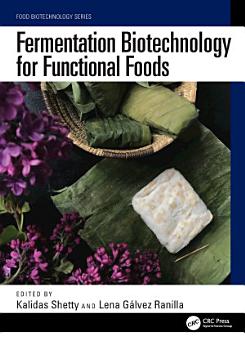Fermentation Biotechnology for Functional Foods
About this ebook
This book focuses on bringing together diverse emergences and advancements of fermented foods across different regions of the world and how the metabolic processes associated with fermentation in several cases add health-relevant functional qualities across different food matrixes. This book contains 26 chapters from the Americas, Africa, Europe and Asia, bringing together the fermentation processes of diverse food substrates and their microbial processing and in several cases providing health-targeted functional benefits.
Key Features:
- Discusses the rationale and basis of fermented food systems from across 26 diverse regions of the world with examples from the Americas, Asia, Europe and Africa
- Presents historical plant and animal food substrates and the metabolic processes of their fermentation across traditions of a range of countries
- Covers traditional food fermentations across diverse food substrates that have potentially health-relevant functional benefits
- Reflects and presents the role of historical, cultural and traditional food concepts of a diverse range of countries with many novel examples and how they have influenced health-relevant functional benefits
- Discusses the relevance of metabolic concepts of fermented and functional foods in advancing healthy food concepts
This book is important for food scientists, nutritionists and the health care sector, but beyond this, it is also relevant for a wider global audience interested in a holistic health approach from food systems where examples of fermentation experience can inform new natural processing strategies to improve food quality and health.
About the author
Dr. Kalidas Shetty is Professor of Plant Sciences at North Dakota State University, Fargo, USA. Dr. Shetty's research interests focus on the critical role of cellular and metabolic basis of oxygen biology for advancing new innovations in Life Sciences and especially Agricultural and Food Innovations to advance global food security and health in a sustainable environment. This has relevance to advance scientific, educational and policy strategies to develop climate resilient health-targeted food security solutions including malnutrition and hunger challenges. He has published over 260 manuscripts in peer-reviewed journals and over 50 as invited reviews and in conference proceedings with H-Index of 82 on Google Scholar. In 2004, he was selected by the US State Department as the inaugural Jefferson Science Fellow to advise on scientific issues as it relates to International Diplomacy and International Development. Dr. Shetty has widely traveled presenting lectures and seminars in the areas of Food Biology, Climate Resilient Healthy Food Systems for Food Security & Health, and Food Safety in over 50 countries in Asia, Europe, Africa, and the Americas. His current passion is to advance research, education capacity building and policy on “sustainable and ecological basis for climate resilient healthy food systems and food diversity to drive global food security. This vision is based on crops and food diversity, indigenous wisdom, traditional fermentations, and new technology innovations in ethnic and indigenous food systems integrating understanding of comparative cellular biochemistry of plant and animal systems and their interactions with microbial systems in diverse ecologies.
Dr. Lena Gálvez Ranilla is a Professor of Universidad Catolica de Santa Maria, Arequipa, Peru. Dr Galvez has a PhD in Food Science by the University of Sao Paulo, (Brazil) with a sandwich doctoral research at the University of Massachusetts (Department of Food Science, USA). Currently, she leads the Laboratory of Research in Food Science at Universidad Catolica de Santa María (Peru). She received the prize of L'Oréal-UNESCO-National Council for Science and Technology (Peru)-National Academy of Sciences (Peru) for Women in Science. Dr. Galvez research has been focused on the study of the Latin-American food biodiversity as a potential source of bioactive compounds with health-relevant functional properties. She has led research projects funded by Peruvian and International institutions aimed at valorizing crop diversity with focus on native grains. Currently, Dr. Galvez group is aimed at applying omic-based technologies for the characterization and value addition of Peruvian crop diversity from Andean food systems, and with relevance for health and food security.
